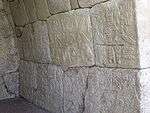Suppiluliuma II


Suppiluliuma II, the son of Tudhaliya IV, was the last known king of the New Kingdom of the Hittite Empire, ruling c. 1207–1178 BC (short chronology), contemporary with Tukulti-Ninurta I of Assyria.
His life and reign
In 1210 BC, a fleet under his command defeated one manned by the Cypriots, the first recorded naval battle in history.[1] According to some historians (Claude Schaeffer, Horst Nowacki, Wolfgang Lefèvre), this and following two victories against Cypriots were probably won by using Ugartic ships.[2]
He is known from two inscriptions in Hieroglyphic Luwian. They record wars against former vassal Tarhuntassa, and against Alasiya in Cyprus. One inscription is found at the base of Nisantepe in the Upper City of Hattusa; the other is on the northern corner of the East Pond (Pond 1), in what is known as Chamber 2. This served as a water reservoir for Hattusa.
The chamber 2 reliefs are historically important since it records major political instability which plagued Hatti during Suppiluliuma's reign. It states that this ruler sacked the city of Tarhutassa which was a Hittite city and had briefly served as the Empire's political capital under the reign of Muwatalli II.
The Hittite kingdom was ultimately destroyed by the invading Sea Peoples and Kaskians in the late 1170s BCE. Based on records in Ugarit, the threat originated in the west, and the Hittite king asked for assistance from Ugarit.
- "The enemy [advances(?)] against us and there is no number [...]. Our number is pure(?) [. . .] Whatever is available, look for it and send it to me."[3]
Ammurapi, an ally of Suppululiuma II and the last king of Ugarit, wrote a letter outlining the threat posed by the invading Sea Peoples and pleaded for help from Eshuwara, the ruler of Alasiya (Cyprus):
| “ | My father, behold, the enemy's ships came (here); my cities(?) were burned, and they did evil things in my country. Does not my father know that all my troops and chariots(?) are in the Hittite country, and all my ships are in the land of Lukka? . . . Thus, the country is abandoned to itself. May my father know it: the seven ships of the enemy that came here inflicted much damage upon us.[4] | ” |
After Suppiluliuma's kingdom collapsed, the Kaskian tribes were probably in control of Hatti. Hattusa itself was destroyed by fire, its site only re-occupied by a Phrygian fortress some 500 years later. Kuzi-Teshub, a ruler of Carchemish, would later assume the title of "Great King" since he was a direct descendent of Suppiluliuma I.[5]
Some sources indicate Suppiluliuma II's end is unknown or he was simply "vanished",[2] while some claim he was killed during the sack of Hattusa in 1190 BCE.[6]
| Hittite New Kingdom royal family tree | |
|---|---|
| |
References:
| |
Notes:
|
See also
Notes
- ↑ Battle at Sea: 3,000 Years of Naval Warfare. R. G. Grant. 2008. Accessed 10 August 2010
- ↑ trans Astour, AJA 69 (1965), p.256
- ↑ Jean Nougaryol et al. (1968) Ugaritica V: 87-90 no.24
- ↑ Trevor Bryce, The Kingdom of the Hittites, Oxford University Press, 1998. p.384
- ↑ Robert Drews The Coming of the Greeks: Indo-European Conquests in the Aegean and the Near East Princeton University Press, 1994 ISBN 0691029512
References
- Astour, AJA 69 (1965).
- Güterbock, JNES 26 (1967), 73-81.
External links
| Regnal titles | ||
|---|---|---|
| Preceded by Arnuwanda III |
Hittite king ca. 1207–1178 BC |
Kingdom collapsed |